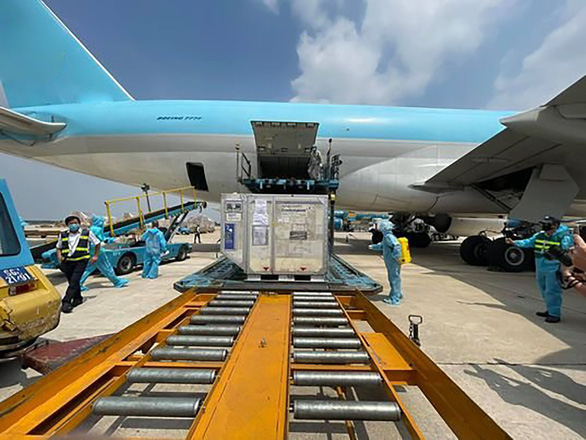
CDC Hanoi's cold warehouse
At a working session with Deputy Minister of Health Truong Quoc Cuong recently, CDC Hanoi Deputy Director Nguyen Thi Kieu Anh said CDC Hanoi has one cold warehouse with the capacity of 40 cubic meters, which can contain an additional 150,000 AstraZeneca vaccine doses, and one cold warehouse with the capacity of 16 cubic meters which can contain an additional 100,000 AstraZeneca doses.
Hanoi also has six 3000 and 3000 AC refrigerators (the capacity of 126 liters can contain 10,000 doses each), and six cold boxes with the capacity of 44 liters each.
According to CDC Hanoi, the total number of AstraZeneca vaccine doses that can be preserved is 310,000. As for medical centers and medical stations, there are 34 TCW 3000 and 3000AC refrigerators with a capacity of 126 liters and maximum capacity of 10,000 doses each, not including vaccines for the expanded vaccination program. The additional capacity for storing vaccines under the expanded vaccination program is about 8,000 doses on average.
At medical stations, as of May 2021, there were 488 vaccine storage cabinets (of which 69 had broken down, awaiting repair) with a capacity of 70 liters, and an additional capacity of 2,500 doses each.
As such, the total number of vaccine doses that can be preserved at medical centers and medical stations is 1.27 million doses.
Truong Quang Viet from CDC Hanoi said the cold warehouse at the Capital Military Zone could contain 1.3 million doses, nearly the same as Hanoi’s capacity. The vaccines from the warehouse can be carried directly to districts’ medical centers in Hanoi without going through CDC.
According to Anh, there is still no equipment to preserve vaccines at sub-zero temperature. The existing capacity is not enough to preserve vaccines of different kinds from different manufacturers in large quantities when necessary.
VNVC currently has standard storage for vaccine preservation. In January 2021, the Ministry of Health (MOH) licensed VNVC’s sub-zero vaccine storages with the temperature of up to minus (-) 86oC. At each sub-zero cold storage, there is a defrost warehouse that has a temperature below 8oC, thus ensuring the safe defrosting of vaccines before they are put into use.
With the capacity of 100,000 doses for each refrigerator, the three sub-zero cold storages of VNVC in HCM City, Hanoi and Da Nang with 30 sub-zero refrigerators (18 in HCM City, 5 in Da Nang and 7 in Hanoi), could contain 3 million vaccine doses at the same time.
With its facilities, VNVC was allowed by MOH to import/export vaccines and provide vaccine and bioproduct preservation in cold conditions of 2-8oC and sub-zero conditions from minus 40oC to minus 86oC.
As for the vaccines that need sub-zero temperature preservation, the expanded vaccination program still does not have a cold chain system to preserve vaccines at this temperature.
Among the paid immunization system, the VNVC’s sub-zero temperature cold storage is the only facility that can satisfy the requirements to preserve millions of doses of the vaccines that must be preserved at sub-zero temperature, such as Pfizer-BioNtech and Moderna.
| In addition to the sub-zero temperature cold storage system, VNVC’s network of 55 immunization centers now has 55 separated vaccine storehouses and 3 specialized general depots, now preserving vaccines at the temperature of 2-8oC, with the total containing capacity of 180 million doses at the same time. |
In addition to the sub-zero temperature cold storage system, VNVC’s network of 55 immunization centers now has 55 separated vaccine storehouses and 3 specialized general depots, now preserving vaccines at the temperature of 2-8oC, with the total containing capacity of 180 million doses at the same time.
Global supply
According to the World Health Organization (WHO), up to 50 percent of vaccines are spoiled because of the lack of adequate infrastructure. If this happens with Covid-19 vaccine, the world may lose billions of doses.
Reports show that the global cold storage chain market was estimated at $4.7 billion in 2019 and $8.2 billion by 2025, with an average growth rate of 12.5 percent in 2020-2025 period.
The world is witnessing the lack of super-refrigerators to keep vaccines. In the US, hospitals in cities rushed to buy freezers to store vaccines, but in rural areas not all hospitals could afford to buy these expensive freezers.
While the vaccine developed by Pfizer and BioNTech is highly effective against Covid-19, it has a big disadvantage – it needs to be preserved at minus 70oC. Common freezers cannot satisfy this requirement, which makes the distribution of vaccines a logistics nightmare.
Sub-zero freezers are very expensive and adds costs to the medical system.
The freezer demand has caused overloading for service providers. Helmer said it cannot deliver new freezers until March. Many hospitals have ordered freezers but were turned down.
In Vietnam, this service segment is still completely new. Before the Covid-19 pandemic broke out, the annual growth rate of the segment was 11-12 percent. Cold logistics, including cold storage, in Vietnam is a niche segment of the logistics industry, but is witnessing hot development.
Trang Bui from JLL said the problem of preserving vaccines could be the factor that accelerates the further development of the cold logistics segment.
Duy Anh

1.2 million more AstraZeneca vaccine doses arrive in VN
A further 1.228.500 doses of the AstraZeneca COVID-19 vaccine arrived in HCM City’s Tân Sơn Nhất Airport this morning.

More investment poured into cold storage facilities
While many industries are suffering during the Covid-19 pandemic, cold storage supply chains are heating up the logistics industry.
d
